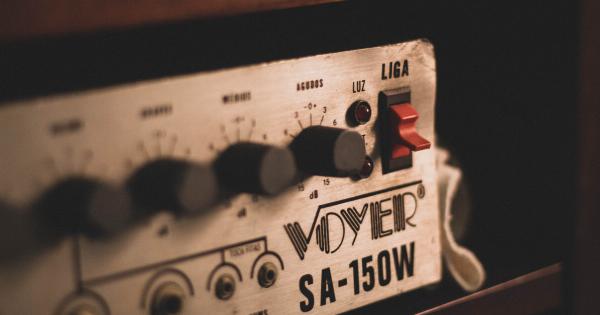Postoperative pain is a common problem that affects patients after surgery. Traditional approaches include pharmaceutical pain relievers and analgesics, but these can often have unwanted side effects and potential for addiction.
As a result, more and more patients are looking for non-conventional approaches to pain management to reduce their reliance on medication. In this article, we will explore some of these alternative approaches to pain management that may help postoperative patients reduce their discomfort and recover more quickly.
Acupuncture
Acupuncture is an increasingly popular approach to pain management that has been used for thousands of years.
The practice of acupuncture involves the insertion of small needles into specific points on the body, which are thought to stimulate energy flow and alleviate pain. In the context of postoperative pain, acupuncture has been shown to be effective in reducing pain and inflammation, as well as decreasing the need for traditional pain medications.
Acupuncture can be performed before or after surgery, and may be used in conjunction with other pain management strategies.
Hypnotherapy
Hypnotherapy is a type of therapy that uses hypnosis to achieve a state of relaxation and suggestibility in patients.
In the context of pain management, hypnotherapy has been shown to be effective in reducing pain, anxiety, and stress in postoperative patients. It can also improve sleep quality and reduce the need for pain medications. Hypnotherapy may involve visualization exercises, relaxation techniques, and guided imagery to help patients manage their pain and promote healing.
Massage Therapy
Massage therapy is a type of therapy that involves the manipulation of soft tissue to relieve tension and pain.
In the context of postoperative pain, massage therapy has been shown to be effective in reducing pain, anxiety, and stress, as well as promoting healing and improving range of motion. Massage therapy may involve a variety of techniques, including deep tissue massage, Swedish massage, and trigger point therapy. It can be performed before or after surgery, and may be used in conjunction with other pain management strategies.
Yoga
Yoga is a mind-body practice that involves physical poses, breathing exercises, and meditation.
In the context of postoperative pain, yoga has been shown to be effective in reducing pain, anxiety, and stress, as well as improving sleep and promoting healing. Yoga may involve gentle stretching and movement, as well as more advanced poses and breathing exercises. It can be performed before or after surgery, and may be used in conjunction with other pain management strategies.
Mindfulness Meditation
Mindfulness meditation is a type of meditation that involves focusing on the present moment and accepting thoughts and feelings without judgment.
In the context of postoperative pain, mindfulness meditation has been shown to be effective in reducing pain, anxiety, and stress, as well as promoting healing and improving quality of life. Mindfulness meditation may involve focusing on the breath, body scan exercises, and guided meditations. It can be practiced before or after surgery, and may be used in conjunction with other pain management strategies.
Aromatherapy
Aromatherapy is a type of therapy that involves the use of essential oils to promote healing and relaxation.
In the context of postoperative pain, aromatherapy has been shown to be effective in reducing pain, anxiety, and stress, as well as improving sleep and promoting healing. Aromatherapy may involve diffusing essential oils, adding oils to baths or massage oils, or inhaling oils directly. Some commonly used oils in aromatherapy include lavender, peppermint, and eucalyptus.
Chiropractic Care
Chiropractic care is a type of therapy that involves the manipulation of the spine and other joints to improve the alignment and function of the body.
In the context of postoperative pain, chiropractic care has been shown to be effective in reducing pain, improving range of motion, and promoting healing. Chiropractic care may involve spinal adjustments, massage, and other manual therapies. It can be performed before or after surgery, and may be used in conjunction with other pain management strategies.
Naturopathic Medicine
Naturopathic medicine is a type of medicine that focuses on natural approaches to healing, including lifestyle changes, nutrition, and botanical medicine.
In the context of postoperative pain, naturopathic medicine has been shown to be effective in reducing pain, improving sleep, and promoting healing. Naturopathic medicine may involve dietary changes, nutritional supplements, and herbal remedies. It can be used before or after surgery, and may be used in conjunction with other pain management strategies.
Music Therapy
Music therapy is a type of therapy that involves the use of music to promote healing and relaxation.
In the context of postoperative pain, music therapy has been shown to be effective in reducing pain, anxiety, and stress, as well as improving sleep and promoting healing. Music therapy may involve listening to music, playing music, or creating music. It can be performed before or after surgery, and may be used in conjunction with other pain management strategies.
Art Therapy
Art therapy is a type of therapy that involves the use of art to promote healing and self-expression.
In the context of postoperative pain, art therapy has been shown to be effective in reducing anxiety, depression, and stress, as well as promoting healing and improving quality of life. Art therapy may involve drawing, painting, sculpting, or other forms of artistic expression. It can be performed before or after surgery, and may be used in conjunction with other pain management strategies.
Conclusion
Non-conventional approaches to postoperative pain management can provide patients with effective options for reducing pain, promoting healing, and improving quality of life.
These approaches may involve a range of therapies, including acupuncture, hypnotherapy, massage therapy, yoga, mindfulness meditation, aromatherapy, chiropractic care, naturopathic medicine, music therapy, and art therapy. By working with healthcare providers to identify the most effective pain management strategies, patients can reduce their reliance on traditional pain medications and improve their overall health and well-being.





























